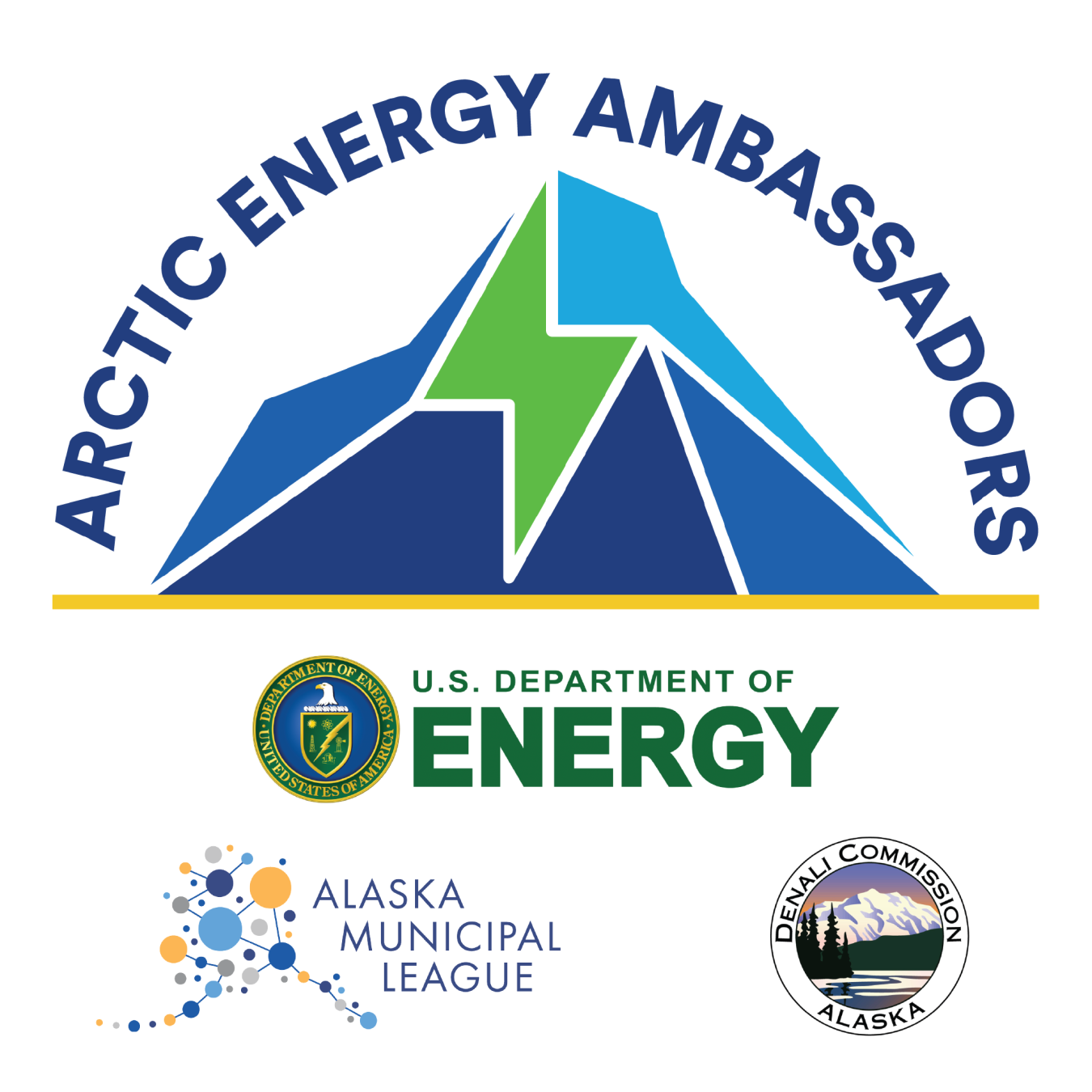
The new Arctic Energy Ambassadors program provides training and support for 12 selected, experienced practitioners from Alaska regions to improve energy security across Alaska. The Ambassadors were selected in January 2024 for a two-year term, during which they will develop regional, place-based, and collaborative energy leadership in Alaska, along with resources and knowledge-sharing in alignment with the U.S. Department of Energy’s Arctic Strategy and the clean energy transition.
Visit the Arctic Energy Ambassadors website page hosted by the Alaska Municipal League to see more!
The Arctic Energy Ambassadors program is led by the Arctic Energy Office, in partnership with the Denali Commission, Alaska Municipal League, and with additional funding from the Office of Energy Efficiency and Renewable Energy and the Office of State and Community Energy Programs.
Through deployment of energy projects and support for grant applications and technical assistance, the U.S. Department of Energy is delivering resources and partnership for the Arctic region, aligned with the DOE Arctic Strategy.

Our Ambassadors
Meet the 12 passionate, community-focused communicators from Alaska’s Arctic territories who have been selected for a two-year term as an Arctic Energy Ambassador for the U.S. Department of Energy.
- Kristina D. Andrew, representing the Bristol Bay region. Host organization: DeerStone Consulting
- Eddie Dellamary, representing the Interior region. Host organization: Tanana Chiefs Organization
- Robert Venables, representing the Southeast region. Host organization: Southeast Conference
- Laresa Syverson, representing the Aleutian region. Host organization: Ounalashka Corporation
- Bertha Prince, representing the Calista region. Host organization: Nuvista Light & Electric Cooperative, Inc.
- Reuben Brown, representing the Chugach region. Host organization: PWS Economic Development District
- Amanda Toerdal, representing the Bering Strait region. Host organization: Kawerak, Inc.
- Cassidi Cameron, representing the Cook Inlet region. Host organization: Kenai Peninsula Economic Development District
- Jennifer Rosenthal, representing the Ahtna region. Host organization: Copper Valley Development Association
- Tyler Kornelis, representing the Kodiak region. Host organization: Kodiak Area Native Association
- Chan Charoonsophonsak, representing the North Slope region. Host organization: National Renewable Energy Laboratory (NREL)
- Kathleen M. Stuckey, representing the Northwest Arctic region. Host organization: Atautchikun, LLC.
Learn more in our introductory blogs:
Note: The Ambassador for the Calista region changed in September 2024. We thank Sean Glasheen for serving in this role from January - September 2024. The Ambassador for the Ahtna region changed in January 2025. We thank Leann Sommer for previously serving in this role.
Program Goals
Goal 1: Articulate community and regional energy needs through a cohort of local champions.
Goal 2: Connect stakeholders and promote professional and regional capacity development through ongoing DOE training and engagement.
Goal 3: Provide regional technical assistance to advance project development.
Goal 4: Develop regional or statewide projects, with solutions to energy issues that could be replicated throughout the Arctic.
Goal 5: Vet projects through an online project clearinghouse/portal for energy community funding sources including federal, State, and local/private sector opportunities through the Alaska Municipal League.
background
Originally conceived in 2014 under the DOE Office of Indian Energy Policy and Programs, the Alaska Energy Ambassadors Program developed regional energy leadership in the state through deployment of energy projects and support for grant applications and technical assistance. However, the program was limited to tribal stakeholders, had low-level funding, and focused on grants. The Arctic Energy Office (AE) seeks to reinvigorate this program to include all Alaska stakeholders and develop an AE-led network of energy leaders to help move the state towards sustainable and impactful projects that could be supported by DOE programs or other funding sources such as other federal agencies, the State of Alaska, or private sector partners.
Questions?
Please reach out to [email protected] for questions about this program. Thank you!

